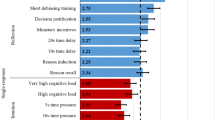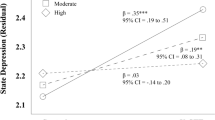Abstract
Despite previous research suggesting that participants’ negative and positive emotions can impair and facilitate reasoning performance, a recent study proposes that the emotional content of the mood induction materials may not be crucial in eliciting these phenomena—deontic selection task performance is as poor when these materials are neutral as when they are negative (Perham and Oaksford 2006). We extend this finding to syllogistic reasoning performance. Participants in the mood induction conditions (negative and neutral) verbally described their experiences in relation to twenty negative or neutral words whereas participants in the control condition received no such mood induction. Subsequent syllogistic reasoning performance was significantly poorer for both mood induction conditions yet only those in the negative mood induction condition showed a significant increase in anxiety. Results imply that the key mechanism involved in the impairment derives from the production of irrelevant thoughts and that these need not be linked to a positive or negative mood, thus “not thinking” may actually help the reasoning process.


Similar content being viewed by others
References
Appleby, P., & (Executive Producer). (1989). Wildlife on one. Bristol: BBC.
Blanchette, I., & Richards, A. (2010). The influence of affect on higher level cognition: A review of research on interpretation, judgement, decision making and reasoning. Cognition and Emotion, 24(4), 561–595.
Bradley, M. M., & Lang, P. J. (1999). Affective norms for English words (ANEW): Stimuli, instruction manual and affective ratings. Technical report C-1. Gainesville: The Center for Research in Psychophysiology, University of Florida.
Channon, S., & Baker, J. (1994). Reasoning strategies in depression—effects of depressed mood on a syllogism task. Personality and Individual Differences, 17(5), 707–711.
Clark, D. M., & Teasdale, J. D. (1982). Diurnal variation in clinical depression and accessibility of memories of positive and negative experiences. Journal of Abnormal Psychology, 91, 87–95.
Derakshan, N., & Eysenck, M. W. (1998). Working memory capacity in high trait anxious individuals and repressors. Cognition and Emotion, 12(5), 697–713.
Derryberry, D., & Reed, M. A. (2002). Anxiety-related attentional biases and their regulation by attentional control. Journal of Abnormal Psychology, 111, 225–236.
Ellis, H. C., & Ashbrook, P. W. (1988). Resource allocation model of the effects of depressed mood states. In K. Fiedler & J. Forgas (Eds.), Affect, cognition and social behavior (pp. 25–43). Toronto: Hogrefe.
Eysenck, M. W. (1979). Anxiety, learning, and memory: A reconceptualization. Journal of Research in Personality, 13, 363–385.
Jones, D. M., & Tremblay, S. (2000). Interference in memory by process or content? A reply to Neath (2000). Psychonomic Bulletin and Review, 7, 550–558.
Jones, D. M., Farrand, P., Stuart, G., & Morris, N. (1995). Functional equivalence of verbal and spatial information in serial short-term memory. Journal of Experimental Psychology: Learning, Memory and Cognition, 21, 1008–1018.
Manktelow, K. I., & Over, D. E. (1991). Social roles and utilities in reasoning with deontic conditionals. Cognition, 39, 85–105.
Melton, R. J. (1995). The role of positive affect in syllogism performance. Personality and Social Psychology Bulletin, 21, 788–794.
Mogg, K., Millar, N., & Bradley, B. P. (2000). Biases in eye movements to threatening facial expressions in generalized anxiety disorder and depressive disorder. Journal of Abnormal Psychology, 19, 695–704.
Oaksford, M., & Chater, N. (2007). Bayesian rationality: The probabilistic approach to human reasoning. Oxford: Oxford University Press.
Oaksford, M., Morris, F., Grainger, B., & Williams, J. M. G. (1996). Mood, reasoning, and central executive processes. Journal of Experimental Psychology: Learning, Memory and Cognition, 22(2), 476–492.
Perham, N., & Oaksford, M. (2005). Deontic reasoning with emotional content: Evolutionary psychology or decision theory? Cognitive Science, 29, 681–718.
Perham, N. & Oaksford, M. (2006). Experienced and anticipated emotion in deontic reasoning. Proceedings of the 28th cognitive science annual conference, Vancouver, Canada.
Perham, N., Banbury, S., & Jones, D. M. (2005). Auditory distraction impairs analytical reasoning performance. In M. Katsikitis (Ed.), Past reflections, future directions: Proceedings of the 40th Australian psychological society annual conference (pp. 238–242). Melbourne: APS.
Perham, N., Banbury, S., & Jones, D. M. (2007). Reduction in auditory distraction by retrieval strategy. Memory, 15, 465–473.
Saffran, J. (2002). Constraints on statistical learning. Journal of Memory and Language, 47, 172–196.
Smeets, G., de Jong, P. J., & Mayer, B. (2000). If you suffer from a headache, then you have a brain tumour: Domain-specific reasoning ‘bias’ and hypochondriasis. Behaviour Research and Therapy, 38, 763–776.
Spielberger, C. D., Gorsuch, R., & Lushene, R. (1970). The State trait anxiety inventory (STAI) test manual. Palo Alto: Consulting Psychologists Press.
Wason, P. C. (1968). Reasoning about a rule. Quarterly Journal of Experimental Psychology, 20, 273–281.
Williams, J. M. G., Chan, S., Crane, C., Barnhofer, T., Eade, J., & Healy, H. (2000). Retrieval of autobiographical memories: The mechanisms and consequences of truncated search. Cognition and Emotion, 20, 351–382.
Williams, J. M. G., Teasdale, J. D., Segal, Z. V., & Soulsby, J. (2000). Mindfulness-based cognitive therapy reduces overgeneral autobiographical memory in formerly depressed patients. Journal of Abnormal Psychology, 109, 150–155.
Author information
Authors and Affiliations
Corresponding author
Rights and permissions
About this article
Cite this article
Perham, N., Rosser, J. “Not Thinking” Helps Reasoning. Curr Psychol 31, 160–167 (2012). https://doi.org/10.1007/s12144-012-9140-7
Published:
Issue Date:
DOI: https://doi.org/10.1007/s12144-012-9140-7




